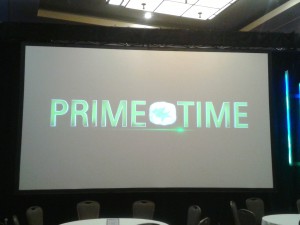Prime Time ’16: ‘The future is not ad-free’
Shaw Media's Barb Williams on why the TV industry can't hope to survive on subscription models alone, and more highlights from the first day of Prime Time.
As the first post-Let’s Talk TV Prime Time conference in Ottawa kicked off on Thursday, an opening panel featuring some of the biggest players in Canadian media tried to unravel the best ways to continue to make money off of content, with Shaw Media EVP broadcasting and president Barb Williams arguing the industry cannot survive on subscriptions alone.
“The future is not ad-free. From our point of view, that is a key piece of this content monetization puzzle…there will be some subscription models, there will be some hybrid, but at the end of the day the subscription model will not sustain the industry,” Williams said.
When doing the math, Williams argued consumers cannot afford to pay for all the pieces of content they may want. Shaw Media’s experience in the lifestyle space has shown the broadcaster that advertisers still want to reach television audiences, but the key is gathering more data on who those audiences are. (At Ad Week in Toronto last week, Playback sister publication Media in Canada reported on Shaw Media’s reveal of new advertising packages based on data it was gathering from Shaw Communications’ cable set-top boxes.)
“We believe there is a lot of power….in merging the intelligence of data with the power of television. We think as an industry we have not got there yet, and there is money on the table that can really help to support the hybrid models or the pure ad models and keep sustaining some terrific content production,” Williams said.
The inability of digital options to make up for current television revenues was also explored by Heather Conway, CBC’s EVP of English services, during the panel, which she said in turn impacts the ability of creators to monetize their content.
“We need to figure out how to deal with the fact that the price for content is being crushed,” Conway said. The plethora of digital platforms available is also creating an environment where consumers aren’t in tune with the cost of actually producing high-quality content, added Conway. “You are training an entire generation that content is free,” she said.
DHX president and COO Steve DeNure disagreed, telling audiences that his company’s alternative distribution strategies, such as YouTube (where DeNure said DHX was getting between 500 and 600 million views each month across its various channels), were working well.
Prior to the media panel, CMPA leader Reynolds Mastin used the opportunity of opening the conference to argue once again for the regulation of OTT services via what has often been referred to as a “Netflix tax.”
“Let’s get one thing out of the way first. Is a Netflix tax coming? Yes, it is,” he told delegates. Though the CRTC dropped its pursuit of the streaming service’s financials in September 2014, the time has arrived to reopen the conversation, said Mastin. “The first test is for the commission to reiterate its request for the ever elusive business data. And if necessary, compel its disclosure,” he said.
On the topic of alternative media models, global media darling Vice was the subject of a later panel, in which the company’s new chief international growth officer David Purdy – formerly of Rogers Media – said the Canadian arm of the media co is exploring expanding onto the West Coast. As the rest of the industry grapples with monetizing digital to bolster sliding TV revenues, Vice is taking the opposite tack, expanding into linear TV based off the success of its digital model.
“We would love to expand out west and we’re in discussion with a Canadian broadcast ownership group about the possibility of taking on some work that would allow us to do that, but our intent would for sure to have more presence nationally…Vancouver would be one of the first places we’d love to set up shop,” Purdy said.
So far, opportunities for indies have appeared to be limited for Viceland: the Canadian channel will launch with nine original series, all produced in-house by Vice’s Toronto studio. However, Purdy indicated perhaps that may change. “Filling that channel [Viceland] will be difficult, so there’s a real opportunity for the independent production industry.”
The day also saw Minister of Canadian heritage Melanie Joly make her Prime Time debut, something of a right of passage for a Heritage Minister. She announced the department had signed a new coproduction treaty with Ireland, replacing the original coproduction agreement signed between the two countries in 1989. The copro renewal comes on the heels of the success of Brooklyn (Ireland/U.K./Canada) and Room (Canada/Ireland), both of which are getting solid traction on the awards circuit, with Brooklyn recently hitting $4 million at the Canadian box office. Vikings is a Canada/Ireland coproduction as well.
Joly also spoke on the challenge of increasing the export potential of Canada’s screen-based industries, emphasizing the current government’s desire to create growth by strengthening its ties to international partners.
With files from Julianna Cummins


 The definitive CDN broadcast and production resource.
The definitive CDN broadcast and production resource.










